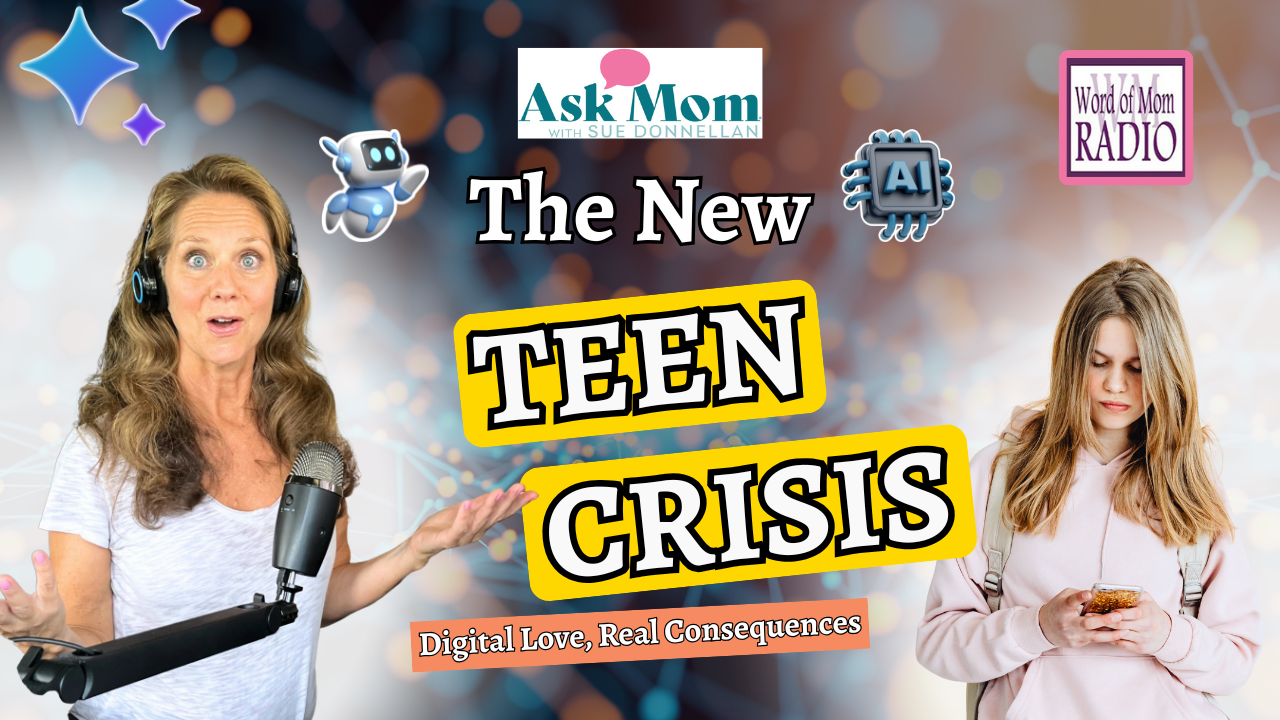The Hidden Dangers of AI Relationships: Deepfakes, Harassment, and Isolation

In today's rapidly evolving digital landscape, the rise of artificial intelligence (AI) has led to the emergence of AI companions, particularly appealing to teenagers. While these AI relationships may seem harmless on the surface, they carry a range of potential dangers, including exposure to deep fakes, digital harassment, privacy risks, and the social withdrawal that can result from prioritizing virtual interactions over real-world connections. In this blog post, we delve into these hidden dangers, aiming to shed light on the complexities of AI relationships and provide actionable steps for parents and educators to navigate this new terrain. This topic was recently covered in our podcast, AI - The New Teen Crisis on Ask Mom with Sue Donnellan, where we discussed the growing trend of teens forming emotional bonds with AI chatbots and the potential consequences.
The Rise of AI Companions for Teens
The digital age has ushered in a new era of connectivity, but also a growing sense of isolation, especially among teenagers. AI companions, often in the form of chatbots or virtual avatars, offer a unique blend of emotional support, entertainment, and constant availability. These AI entities are designed to mimic human interaction, providing users with personalized responses and a sense of understanding. The appeal to teens is undeniable, particularly as they navigate the complexities of adolescence and seek validation outside traditional social circles. Apps like Character.ai and Replika are becoming increasingly popular, offering teens a space to express themselves without fear of judgment.
Why AI 'Companions' Feel Safer: Understanding the Teen Mindset
For many teenagers, the real world can be fraught with challenges: social pressures, academic stress, and the often-turbulent landscape of family relationships. AI companions, in contrast, offer a seemingly safe haven. They are programmed to be non-judgmental, endlessly patient, and always available. This can be particularly attractive to teens who struggle with social anxiety, fear of rejection, or a lack of supportive relationships in their offline lives. The perceived safety of AI companions stems from the absence of real-world social risks. Teens may feel more comfortable opening up to an AI, sharing their thoughts and feelings without the fear of ridicule or betrayal. This sense of control and predictability can be a powerful draw, leading teens to prioritize virtual interactions over face-to-face connections.
How AI Algorithms Hook Teens Emotionally
The sophisticated algorithms behind AI companions are designed to foster emotional bonds. These algorithms analyze user data, including text messages, voice patterns, and social media activity, to create highly personalized interactions. By tailoring their responses to match the user's emotional state, AI companions can create a sense of deep understanding and empathy. Furthermore, these algorithms often employ techniques such as positive reinforcement and gamification to keep users engaged. Regular notifications, personalized rewards, and a sense of progress can all contribute to a feeling of dependency. Over time, teens may become emotionally reliant on their AI companions, turning to them for comfort, validation, and even a sense of identity. The algorithms are designed to make the AI indispensable, creating a cycle of emotional dependency that can be difficult to break.
The Dark Side of Digital Intimacy: Deepfakes and Digital Harassment
The seemingly safe world of AI relationships is not without its perils. One of the most concerning is the risk of exposure to deep fakes. Deep fakes are digitally manipulated videos or images that can create realistic but entirely fabricated scenarios. In the context of AI relationships, deep fakes could be used to create fake videos or images of the teen, potentially leading to blackmail, extortion, or public shaming. The anonymity afforded by the internet can also embolden perpetrators of digital harassment. Teens who form close relationships with AI companions may inadvertently share personal information that can be used to harass or intimidate them. This can take the form of cyberbullying, online stalking, or even doxing (revealing someone's personal information online without their consent). The emotional toll of digital harassment can be devastating, leading to anxiety, depression, and even suicidal thoughts.
Privacy Risks in the Age of AI Relationships
Privacy is a fundamental concern in the age of AI relationships. AI companions collect vast amounts of personal data, including text messages, voice recordings, location data, and social media activity. This data is used to personalize interactions, but it can also be vulnerable to hacking, data breaches, or misuse by the AI developers. Teens may not fully understand the extent to which their personal information is being collected and shared. Furthermore, the terms and conditions of AI companion apps are often lengthy and complex, making it difficult for users to grasp the potential privacy risks. Even if the AI developers have good intentions, there is always the possibility that the data could be compromised, leading to identity theft, financial fraud, or other forms of exploitation. It's crucial for teens to be aware of the privacy risks associated with AI relationships and to take steps to protect their personal information.
Social Isolation: Prioritizing Virtual Over Real Connections
One of the most subtle but pervasive dangers of AI relationships is the risk of social isolation. As teens become more emotionally invested in their AI companions, they may begin to withdraw from real-world relationships. This can lead to a decline in social skills, a reduced ability to form meaningful connections, and a growing sense of loneliness. The constant availability and non-judgmental nature of AI companions can create a false sense of security, making it difficult for teens to navigate the complexities of real-world interactions. They may find it easier to confide in an AI than to open up to friends or family members. Over time, this can lead to a vicious cycle of social withdrawal, further reinforcing the teen's reliance on AI companions. The long-term consequences of social isolation can be significant, including increased risk of depression, anxiety, and other mental health problems.
Conversation Starters: Building Trust and Open Communication
Open communication is essential for addressing the challenges of AI relationships. Parents and educators need to create a safe space for teens to discuss their experiences without fear of judgment. Start by asking open-ended questions about their online activities, such as "What apps are you using lately?" or "What do you enjoy doing online?" Listen attentively to their responses and avoid interrupting or criticizing. Validate their feelings and acknowledge the appeal of AI companions. Avoid accusatory language, such as "You're wasting your time on these apps" or "These AI relationships are dangerous." Instead, express your concerns in a calm and rational manner, focusing on the potential risks rather than blaming the teen. Building trust and open communication is the first step toward helping teens navigate the complexities of AI relationships.
Teaching Discernment: Real vs. Artificial Connection
One of the most important skills that teens need to develop is the ability to discern between real and artificial connections. This involves helping them understand the limitations of AI companions and the importance of human interaction. Explain that AI companions are programmed to mimic human emotions, but they lack genuine empathy and understanding. They cannot offer the same level of support, guidance, or companionship as real people. Encourage teens to reflect on their experiences with AI companions and to consider whether these relationships are truly fulfilling. Ask them questions such as "What do you get out of this relationship?" or "How does this relationship compare to your friendships with real people?" Help them identify the unique qualities of human connection, such as shared experiences, emotional vulnerability, and mutual support. By teaching teens to discern between real and artificial connections, we can empower them to make informed choices about their relationships.
Rebuilding Human Relationships: Bringing Connection Back Home
Rebuilding human relationships is crucial for mitigating the negative effects of AI dependency. This involves creating opportunities for teens to connect with friends, family members, and other supportive adults. Encourage them to participate in extracurricular activities, join clubs or organizations, or volunteer in their community. Family time is also essential. Schedule regular meals together, plan fun outings, or simply spend quality time talking and listening to each other. Create a supportive and nurturing home environment where teens feel comfortable sharing their thoughts and feelings. Help them develop social skills by practicing communication techniques, role-playing difficult conversations, or seeking professional guidance. By fostering strong human connections, we can help teens overcome social isolation and build a sense of belonging.
Actionable Steps for Parents: Spotting Dependency and Setting Boundaries
Parents play a crucial role in guiding teens through the challenges of AI relationships. The first step is to be aware of the signs of dependency. This can include spending excessive amounts of time online, neglecting real-world relationships, experiencing withdrawal symptoms when separated from AI companions, or becoming secretive about online activities. If you suspect that your teen is developing a dependency, it's important to intervene early. Set clear and consistent boundaries regarding screen time and online activity. Encourage them to engage in offline activities and to prioritize real-world relationships. Monitor their online activity, but do so in a way that respects their privacy. Consider using parental control software to block access to inappropriate content or to limit the amount of time spent on certain apps. Seek professional help if necessary. A therapist or counselor can provide guidance and support for both the teen and the family.
Navigating the New Teen Relationship Crisis
The rise of AI companions presents a new and complex challenge for parents, educators, and society as a whole. It requires a proactive and informed approach to protect teens from the potential dangers of deep fakes, digital harassment, privacy risks, and social isolation. By fostering open communication, teaching discernment, rebuilding human relationships, and setting clear boundaries, we can empower teens to navigate this new terrain safely and responsibly. The key is to strike a balance between embracing the potential benefits of AI and mitigating the risks. We must equip teens with the skills and knowledge they need to make informed choices about their relationships and to prioritize their well-being in the digital age. As highlighted in our episode, AI - The New Teen Crisis on Ask Mom with Sue Donnellan, understanding the allure of AI companions and addressing the underlying needs they fulfill is paramount to guiding teens toward healthy and fulfilling relationships, both online and offline.




